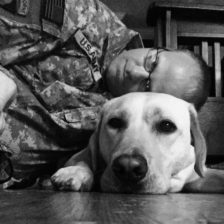Veteran’s Day is coming. In all honesty, it is now a day that puts me on alert, if you will. I am a little on edge because I never know what Sam might be feeling, or what he may be “hearing” or “reading” from those who want to remind him of the day.
Now, I’m not saying it is bad to reach out and thank him for his service, but honestly, that statement can be loaded (no pun intended) for some Veterans. And, while it is hard to remember at times, there is a difference between Veteran’s Day, Memorial Day, and, we all know (or should know) why Veteran’s Day is important.
For some, it will be a time to celebrate. I can’t even begin to tell you how many fliers, sales, freebies, and other “things” come along with Veteran’s Day. I’ve noticed them already. I see lists made of restaurants offering free meals, businesses offering specials, or even sales. Businesses and companies promoting that they will offer you a heckva deal on Veteran’s Day.
No.
Please be cautious with that.
Don’t capitalize on a holiday for your own benefit (or that of your company).
However, not every Veteran enjoys Veteran’s Day. It might be painful to pay respects to those who have served. While Veteran’s Day is intended to celebrate the service of all military veterans, it is hard for some.
You see, there’s this thing that affects some of our Veterans called PTSD. And until you live with it, or live with someone who struggles with PTSD, you may not realize that some basic days, some important days, days worth celebrating are not really days to celebrate or remember at all.
So, what would a loved one who has PTSD want you to know, or remember especially around times that could be “triggers,” or those “anniversary dates?”
- There might be those who live with PTSD who just need their space. Don’t overwhelm with questions, and don’t poke and prod–they will come to you when they are ready, they just might need some time. I’ve learned this first hand. Sure, I’d love to sit down with Sam and talk about all of his tours, but I also know that’s somewhat inappropriate because it could be overwhelming and bring back some really bad memories.
- Be patient. If I’ve learned anything in this journey, it is that patience is key. Living with PTSD is not easy, and there are times when Sam just needs to be alone, or process his thoughts. Understanding that is also being patient. I know in time, and when he is ready he will open up.
- Treat those who have PTSD with respect, the last thing they want is pity. Please don’t say “I understand.” or “Try to get over it, you are home.” Those words are hurtful, and it is hard to understand an experience you have never had, because some of the realities of war that live with our Veterans every day we may not be able to fully comprehend. Compassion. Use compassion.
- Realize that there are going to be good and bad days. Not every day is sunshine and rainbows. Not every day is a bad day. There will be highs and lows, ups and downs, but the better the support system, the better those days will be.
- Anticipate anniversary dates and respect that certain days, holidays, and weeks could be rough. I know there are times where Sam has seemed distant, or not really present in the moment. Some of those instances have been during an anniversary time. Christmas is not an easy time for Sam. Christmas Day is rough.
- Some Veterans who have PTSD working through their trauma do want to share their story; I know this first hand–however, there’s always a small, creeping moment of fear that makes one think they may lose or overwhelm the ones they love. Again, see number 2.
PTSD is hard to process and understand. Although around 10 percent of American forces see combat, it has been said that the U.S. military has the highest rate of post-traumatic stress disorder in its history (Junger, 2015). PTSD is a response to being put in danger, a life and death situation, a traumatizing event (and no, one does not just suffer or develop PTSD from the military, there are other instances in which this can occur).
So, while we look forward to certain holidays, remember that they are not always easy for everyone. Remember there are some folks out there who have anniversaries and dates that are not the good kind, and if it were possible, it would be the kind they would like to forget.
*Sebastian Junger is a journalist who was on assignment in Afghanistan, suffering from classic short term (acute) PTSD due to his time overseas. He shares a story in an article he wrote for Vanity Fair in 2015 titled “How PTSD Became a Problem Far Beyond the Battlefield.”


We walk this journey together. We know that some walk alone. There is help. There is hope.

Hey Sam,
This article was very informative and some great advice. You are doing an awesome job Sam. I am proud of you and Memphis. Gods blessings to you on your journey. I miss you guys. Sending good thoughts and loves to Memphis.